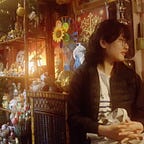Hi there. (not sure who is out there but oh, well.) I’m Mooji. Nice to e-meet you.
Mooji is a pseudonym. I decide not to disclose my real name because I want to feel free when I write without feeling like ‘I=my name’ is naked in the public. But, I am a real person, not a robot or AI or anything. In fact, I would be quite honest about who I am, how I feel, and what I think in this space. (so except my name, you can trust my words and stories, unless stated otherwise.)
I’m an Asian heterogenous woman in the late 20s (soon to be joining the crowd of 30s). I’m originally from South Korea. But, I have lived in Japan and China for a while. Probably that is the reason why I would rather identify myself with ‘Asian’ rather than ‘South Korean’.
So, I was born and raised in Asia. I have never lived in an English speaking country, except for the gap year I took in Halifax, Canada. I was bored and demotivated in my first semester at university. In retrospect, I was also quite angry about the society that projected on me that the only promising path after high school is to go to a (good, if not the best) university. So, I got out of it and explored a different world in Canada.
The reason why I am telling you I am not a native English speaker is that I want to be upfront about my fear. Fear of making mistakes. You will find some parts that are grammatically incorrect or sound unnatural in my writing. Knowing that for sure it is inevitable for me not to make a single mistake, it is definitely scary to write a story in English. However, when I face fear upfront, usually it is easier to let go of it. Also, I set the expectation to others in advance so that there is less chance (theoretically, no chance) of me disappointing you.
You might wonder “what is so ‘scary’ about making mistakes in writing in English? Everyone makes a mistake!” But, the degree of fear and shame that you feel when making a mistake in English is outrageous in South Korea. You would have felt it as well, if you had born and grown up in South Korea where the following two notions are strongly rooted in its culture of education: 1) it is shameful to make a mistake in front of others and 2) English is a strategic currency for upper social mobility.
For the first one, I doubt nobody from any country or cultural background would find it unrelatable. (At least, one of you can relate yourself.) The second one, however, is trickier to explain. English in post-colonial countries is not just one international language, like any other UN’s official languages such as French, Spanish, Arabic, and Chinese. The ability to speak English fluently in post-colonial societies acts as a strategic currency that is associated with social class and mobility of an individual and nation-state. With these cultural associations, the pressure has been built up to speak fluent English.
I’m going to write a story in English, nevertheless. Because I realized, if I do not talk about what I experience and think, I will always be told and explained by someone else. Unlike Asian Americans, it is rare to find the voice of Asian women in the international environment who speaks about their very personal thoughts and experiences. At least that’s how I have felt. At the same time, I, as an Asian woman, is often told, explained or imagined into small boxes of stereotypes by someone else. I learned that by speaking up, I exist as me, who is generous with laughs, not a young Asian woman who is too polite not to smile.
At the same time, I see so many brilliant, smart, and wise friends of mine in Asia who are reluctant to express their thoughts and feelings in English even though they are perfectly capable of doing so. I understand their hesitation and fear. I would be embarrassed to publish an article full of typos and grammatical mistakes for Korean or Japanese speaking audiences. But, for English writing, I learn that I need to reset my intention: Not “to publish perfectly correct writing” but “to put my thoughts out there to communicate”. In this sense, I feel more connected to the origin of languages — to communicate. I hope I can invite my friends to join this circle.
Here, I’m going to write about my daily life. You can read it as a daily reflection of an Asian woman, a woman in 30s, an Asian woman in 30s or any other combination you find interesting. But, this is my endeavor to get out of the typical box of ‘Asian woman in their 30s’ created by someone else, and just to be me, myself in my own words.
When you see any mistakes or unnatural word combinations in my writing, I want you to bear with me for a second, if possible and finish reading the story first. Then, feel free to leave me a comment, advice on how to fix the mistake, or improve the writing in general. But I hope stories will not be discarded just because of the typos and mistakes in writing. (Of course, you are more than free to discard the story as a whole for any other reasons!)
Hmm…
I think… I now feel comfortable. I guess I set the stage safe enough. I feel from now on, I can now focus on writing stories.
I am building a story by writing bit by bit every day 20min. Next week, I’ll come back with a story about my pseudonym.
Till then, stay healthy and happy.
Mooji.
